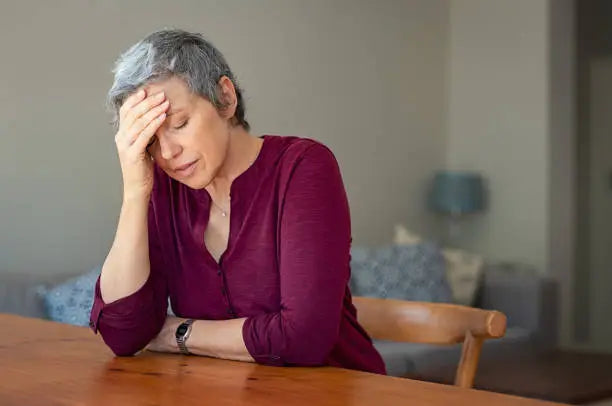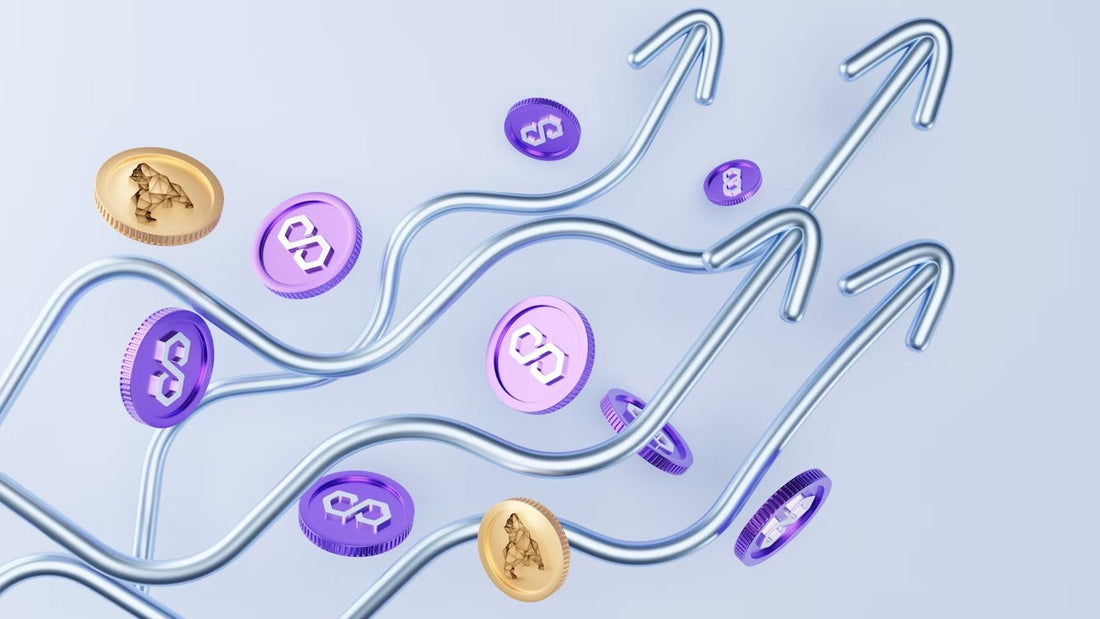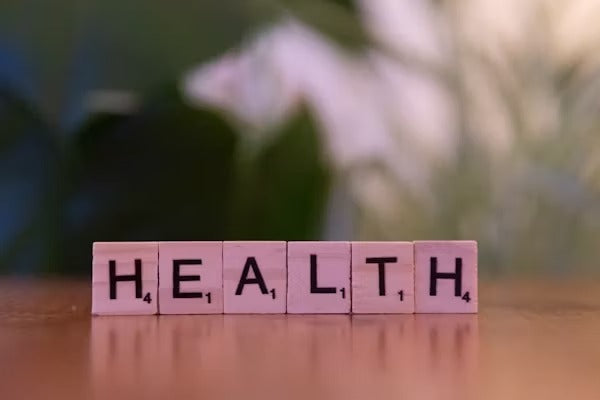Table of Contents:
- The Vicious Cycle: How Anxiety and Sleeplessness Feed Each Other
- The Science Behind Anxiety’s Grip on Sleep
- Why Sleep Deprivation Worsens Anxiety
- Deeper Effects of Chronic Anxiety and Sleeplessness on Daily Life
- Are You Caught in the Anxiety-Sleeplessness Trap?
- Natural Ways to Break the Anxiety-Sleeplessness Cycle
- Other Natural Supplements That Can Complement Melatonin
- From Surviving to Thriving
Ever lay in bed, tired yet wired, as your mind races from one worry to the next?
You’re not alone. In today’s hyper-connected world, anxiety and sleeplessness have become silent companions for millions. What starts as a restless night can quickly spiral into chronic exhaustion, affecting your energy, mood, productivity, relationships — even your long-term health.
The good news? You can regain control—naturally. With the right practices, supplements, and understanding, restful nights and calmer days are within reach.
Let’s dive deeper.
The Vicious Cycle: How Anxiety and Sleeplessness Feed Each Other
Anxiety and sleep are intimately connected — and not in a good way.
When you’re anxious, your nervous system stays in a state of "high alert," making it difficult to fall asleep or stay asleep.
On the flip side, chronic lack of sleep ramps up your stress hormones like cortisol, worsening feelings of anxiety (Harvard Health).
Research published in Sleep Medicine Clinics reveals that individuals with insomnia are 17 times more likely to experience anxiety (ScienceDirect Study).
That's a staggering statistic—and a clear call to action.
How Anxiety and Poor Sleep Affect Your Life
Unchecked, this duo can trigger real consequences:
-
Low energy and mental fog: Making daily tasks feel monumental.
-
Mood swings and irritability: Affecting relationships and self-esteem.
-
Weakened immunity: Leading to more frequent illnesses.
-
Increased risk of depression and cognitive decline: Over time.
The scary part? Many people don't even realize anxiety is quietly eroding their physical health — until it shows up as disease.
The Science Behind Anxiety’s Grip on Sleep
Chronic anxiety keeps your body stuck in a sympathetic dominant state—also known as "fight-or-flight mode."
When this happens:
-
Your brain’s amygdala (the fear center) becomes hyperactive.
-
Cortisol levels spike, making it nearly impossible for the body to relax.
-
Melatonin production plummets, disrupting your natural sleep-wake rhythm (circadian rhythm).
According to research published in Sleep Medicine Clinics, even minor anxiety spikes during the day can significantly delay sleep onset latency (time taken to fall asleep) at night (ScienceDirect Study).
Why Sleep Deprivation Worsens Anxiety
When you consistently miss out on deep sleep:
-
Emotional regulation suffers—making minor stresses feel catastrophic.
-
Your brain struggles with risk evaluation, leading to heightened fear responses.
-
Serotonin levels drop, fueling both anxiety and low mood.
This is why treating sleeplessness is not just about rest—it’s about resetting your entire emotional and hormonal balance.
Deeper Effects of Chronic Anxiety and Sleeplessness on Daily Life
Cognitive Impairment
-
Chronic sleep deprivation and anxiety impair memory, focus, and decision-making.
-
Studies from Harvard Medical School show that even one week of poor sleep reduces cognitive performance to the same extent as being legally drunk (Harvard Health).
-
Forgetfulness, slow thinking, and an inability to concentrate often creep into daily tasks, making work and personal life feel overwhelming.
Strained Relationships
-
Lack of sleep and heightened anxiety shorten your emotional fuse.
-
You may find yourself more irritable, reactive, or withdrawn.
-
Small misunderstandings with friends, family, or partners escalate into arguments, often fueled by the emotional dysregulation that poor sleep and anxiety cause.
Physical Health Risks
Prolonged anxiety and sleeplessness raise the risk of:
-
Hypertension (high blood pressure)
-
Obesity (due to hormone disruption of ghrelin and leptin)
-
Type 2 Diabetes (linked with cortisol and insulin resistance)
-
Heart Disease (poor sleep increases inflammation and vascular strain).
A study from Sleep Medicine Clinics showed that individuals with chronic insomnia had a 45% higher risk of developing cardiovascular diseases (ScienceDirect Study).
Mood Disorders
-
Anxiety and sleeplessness pave the way for depression.
-
Chronic lack of restorative sleep depletes serotonin—the "feel-good" neurotransmitter—further exacerbating anxiety and low mood.
-
It becomes harder to find joy or motivation, creating a cycle that's difficult to break without intervention.
Weakened Immune System
-
Research shows that deep sleep boosts immune defenses by promoting the production of cytokines (infection-fighting proteins).
- Without enough quality sleep, your body's ability to fight off common illnesses—like colds and flus—drops by nearly 30% (Harvard Health).
When left unaddressed, anxiety and sleeplessness don't just make you tired and edgy. They slowly steal your focus, joy, resilience, and physical health, leaving you stuck in survival mode instead of truly living.
Are You Caught in the Anxiety-Sleeplessness Trap?
If you experience three or more of the symptoms below consistently, your body might be signaling that it's time to take action:
- Racing thoughts the moment you lie down in bed
- Struggling to fall asleep even when you're exhausted
- Waking up multiple times at night for no clear reason
- Feeling tired, foggy, or drained even after a full night's sleep
- Short fuse — getting easily irritated or emotional
- Worrying excessively about future events or daily tasks
- Frequent muscle tension, jaw clenching, or headaches
- Craving caffeine or sugar just to "get through" the day
- Feeling disconnected from hobbies, relationships, or work
- Trouble remembering simple things or making decisions
If this sounds familiar, it’s not your fault.
Modern life is fast, overwhelming, and relentlessly stimulating.
Your mind and body aren’t designed to function on constant high alert.
Natural Ways to Break the Anxiety-Sleeplessness Cycle
Let’s explore science-backed natural strategies to regain peace and better sleep.
1. Melatonin: Nature’s Sleep Whisperer
Melatonin is a hormone your brain produces in response to darkness, telling your body it’s time to sleep. But anxiety, screens, and irregular routines can disrupt its production.
Studies show that melatonin supplementation not only improves sleep quality but also reduces symptoms of anxiety (International Journal of Molecular Sciences).
Try This: DameHealth Melatonin Gummies
-
Gentle, non-habit-forming support for falling asleep faster.
-
Helps calm the nervous system, reducing nighttime anxiety loops.
-
Delicious and easy to add to your nightly wind-down ritual.
2. Mindfulness and Deep Breathing
Mindfulness trains your brain to focus on the present rather than spinning into worst-case scenarios. Deep breathing signals your nervous system to shift from "fight-or-flight" into "rest-and-digest."
Harvard research recommends breathing techniques like the 4-7-8 method to ease anxiety and improve sleep onset.
How to try it:
-
Breathe in for 4 seconds
-
Hold for 7 seconds
-
Exhale slowly for 8 seconds
-
Repeat 4–5 cycles before bed
3. Screen-Free Evenings
Screens emit blue light that suppresses melatonin production, tricking your brain into thinking it’s still daytime.
Aim to disconnect at least 1 hour before bed to let your brain ease into natural sleep rhythms.
Bonus Tip: Switch to "night mode" on your devices after sunset.
4. Exercise: A Natural Stress Buster
Regular physical activity boosts endorphins, reduces stress hormones, and improves sleep.
Even 20–30 minutes a day of brisk walking, yoga, or cycling can make a difference.
Just avoid high-intensity workouts too close to bedtime—they may rev you up instead of winding you down.
5. Herbal Allies: Chamomile, Lemon Balm, and Valerian
-
Chamomile tea has been shown to reduce moderate to severe anxiety symptoms (Verywell Health).
-
Valerian root and lemon balm help promote calmness and relaxation naturally.
Tip: Sip a warm herbal tea an hour before bed as part of your wind-down ritual.
Other Natural Supplements That Can Complement Melatonin
While melatonin like DameHealth Melatonin Gummies provides the foundational support, combining it with additional natural nutrients can enhance overall results:
-
Magnesium Glycinate: Known as "nature’s chill pill," magnesium helps relax muscles and calm the nervous system. Check out Magnesium and Tart Cherry by DameHealth.
-
L-Theanine: An amino acid found in green tea, L-Theanine promotes alpha brain waves associated with relaxation without drowsiness.
-
Ashwagandha: An adaptogen that helps lower cortisol and enhance resilience to stress.
These can be used strategically alongside melatonin to tackle both the symptoms and the root causes of anxiety and poor sleep.
Why Small Changes Matter
Anxiety and sleeplessness aren’t character flaws. They are natural responses to an overwhelming world.
But small, consistent habits—like mindful breathing, a proper supplement like melatonin, cutting screens, and daily movement—can retrain your brain and heal your sleep cycles over time.
From Surviving to Thriving
If anxiety and sleeplessness have been stealing your peace, remember: you’re not stuck.
Nature has equipped your body with mechanisms to heal—and modern research now gives us the tools to support those natural processes safely.
By integrating non-addictive aids like DameHealth Melatonin Gummies into your nightly routine, embracing mindfulness, and reclaiming your sleep hygiene, you can transform sleepless anxiety into restful empowerment.





